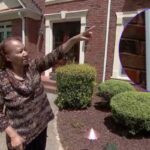Some homeowners in Marietta, Georgia, got more than they bargained for after moving into their picturesque neighborhood across the street from a private country club, dealing with tens of thousands of dollars in property damage over the years.
The culprits? Rogue golf balls.
Don’t miss
- I’m 49 years old and have nothing saved for retirement — what should I do? Don’t panic. Here are 5 of the easiest ways you can catch up (and fast)
- Gain potential quarterly income through this $1B private real estate fund — even if you’re not a millionaire. Here’s how to get started with as little as $10
- Robert Kiyosaki warns of a ‘Greater Depression’ coming to the US — with millions of Americans going poor. But he says these 2 ‘easy-money’ assets will bring in ‘great wealth’. How to get in now
“I came out with my baby in the garage and glass was all over my car,” Jewel Montgomery recalled to Atlanta News First about a golf ball previously shattering her garage door window in a story published May 21.
On top of broken windows and dented vehicles, neighbors shared with the broadcaster they’ve had close calls with golf balls nearly hitting them while mowing the lawn or simply sitting on their deck.
“All of a sudden, a ball hit the bill of my hat,” Ronnie Pope told Atlanta News First, adding the hat protected his face.
“If they hit my daughter. I’m not going to tolerate it,” Montgomery said, referring to her 9-year-old daughter who sometimes plays in the backyard.
Montgomery and Pope have lived across from one of Marietta Country Club’s par-4 holes for nearly 25 years, per Atlanta News First. Both were aware of the nearby golf course, but they “didn’t have a clue of what was going to be happening after,” Pope said.
“I’m scared to go out in my yard,” Montgomery said.
Who foots the bill for the damage?
Montgomery and Pope say the Marietta Country Club’s insurer paid for the very first broken windows over a decade ago, but nothing else since, according to the broadcaster. Montgomery alone says she’s paid over $70,000 out of pocket to replace multiple windows because she doesn’t want her home insurance premiums to go up for filing claims.
“The biggie was the picture frame window and my office windows again,” Montgomery said. “I called and called; I sent a certified letter, and then I got a voice message on Dec. 20, 2024, saying they’re not responsible.”
Atlanta News First says the club did not respond to multiple inquiries about their protocols.
Read more: Want an extra $1,300,000 when you retire? Dave Ramsey says this 7-step plan ‘works every single time’ to kill debt, get rich in America — and that ‘anyone’ can do it
Laws vary by state, but “Georgia recognizes the assumption of risk doctrine,” Ronnie Miles, senior director of advocacy with the National Golf Course Owners Association, told Atlanta News First. This means if you knowingly buy a home near a golf course, you do so understanding the risks involved.
Miles advises homeowners in this situation to reference land records called easements, which can spell out legal rights attached to the land around a golf course.
“There’s an easement that goes around the perimeter so many feet out from the property line of the golf course,” he said. “So balls can penetrate and travel into that area.”
Atlanta News First reports it found documents stating Marietta Country Club’s easement from 1989 protects it from ball-related liability within 30 feet of the property. Montgomery and Pope’s properties, however, are more than 60 feet away. Montgomery says she’s called lawyers but was told they’ll only take a case if there are injuries.
“They need to pay now,” Montgomery said of the club. “They need to move the tee box. They need to put up a net and not have the balls coming over here in this neighborhood because we don’t live on the golf course.”
What to do if you live near a golf course
Finding yourself on the receiving end of a barrage of golf balls? Here’s how to protect your investment if your home is near a golf course:
- Look into land records: Check county deeds for any easements that could affect your rights.
- Track any incidents: Keep photo evidence and records of property damage.
- Seek legal counsel: Especially if the golf ball frequency has escalated or caused injury.
- Ask the club to act: Netting, tee box realignment or tree buffers are options, though not always welcomed by neighbors who live on the course.
The National Golf Course Owners Association reminds golfers it’s possible they can be held liable for property damage from errant shots.
Whether you’re buying near a course, teeing off on the weekend or watching balls fly through your deck screen, the financial and legal stakes can be very real. If you’re a homebuyer eyeing that fairway view, read the easement and understand the risks.
What to read next
- JPMorgan sees gold soaring to $6,000/ounce — use this 1 simple IRA trick to lock in those potential shiny gains (before it’s too late)
- This is how American car dealers use the ‘4-square method’ to make big profits off you — and how you can ensure you pay a fair price for all your vehicle costs
- Here are 5 ‘must have’ items that Americans (almost) always overpay for — and very quickly regret. How many are hurting you?
Like what you read? Join 200,000+ readers and get the best of Moneywise straight to your inbox every week. Subscribe for free.
This article provides information only and should not be construed as advice. It is provided without warranty of any kind.

